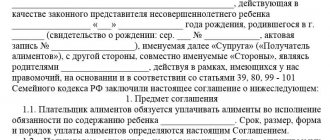MIP online legal encyclopedia - » Family law » Articles on alimony » Responsibilities of adult children to support their parents
Get an expert opinion on how to support your parents in two clicks
Parents who have provided help and care to their children since infancy also need support and attention.
The current family legislation of most countries, including the Russian Federation, imposes an obligation on parents to support their children, both minors and disabled adults. In turn, the RF IC does not provide for responsibilities for minor children as such. Their existence is only assumed in the form of counter-responsibilities of parents, which cannot be said about adult children. The responsibilities of adult children to support their parents are clearly formulated and reflected in Article 87 of the RF IC.
Disabled parents
Parents who have provided help and care to their children since infancy also need support and attention. First of all, this concerns parents who, in accordance with the law, are recognized as:
- Persons of retirement age. Today these are women 55 years and older and men 60 years and older;
- Persons with disabilities of groups I or II.
In rare cases, a disabled parent of group III may apply for financial support if, due to his disability, the latter cannot find a paid job, which is recommended for him by a medical report.
And the RF IC, establishing the obligations of adult children to support their parents, is primarily aimed at protecting the rights of disabled elderly parents.
MBOU GRUSHEVSKAYA SOSH
“LEGAL STATUS, RIGHTS, OBLIGATIONS AND RESPONSIBILITIES
FROM BIRTH TO ACHIEVEMENT OF AGE”
Legal status is your position in the world of law. As you grow older, you receive new opportunities, gain experience, which means you acquire new rights, duties, responsibilities - your status changes.
A CHILD IS A PERSON UNDER THE AGE OF EIGHTEEN YEARS (THE AGE OF MAJORITY)
From birth:
The child has the right:
1. for life (Part 1 of Article 20 of the Constitution of the Russian Federation);
2. first name, patronymic, last name (Article 58 of the Family Code of the Russian Federation);36
3. for citizenship (Article 6 of the Constitution of the Russian Federation, Article 12 of the Federal Law “On Citizenship of the Russian Federation”);
4. live and be raised in a family (Article 54 of the RF IC);
the right to property rights (Articles 54, 57, 60 of the RF IC);
5. to communicate with both parents and other relatives (Article 55 of the RF IC);
6. for defense (Article 56 of the RF IC);
7. to receive maintenance from their parents and other family members (Article 60 of the RF IC).
The child is responsible:
- in front of parents or their substitutes, educators, teachers.
From 6 years old the following are added:
Right:
1. carry out small household transactions,
2. carry out transactions aimed at obtaining benefits free of charge, which do not require notarization or state registration;
3. make transactions to dispose of funds provided by parents or other people, with the consent of the parents for a specific purpose or free disposal (Article 28 of the Civil Code of the Russian Federation).
Duty:
1. obey parents and persons replacing them, accept care and attention, with the exception of cases of neglectful, rude, degrading treatment or insult;
2. receive basic general education (9 grades);
3. comply with the rules of behavior established in educational and educational institutions, at home and in public places.
Responsibility:
1. before parents and persons replacing them, educators, teachers, administration of the educational institution;
2. before your conscience.
From the age of 8 the following are added:
Right:
- to participate in a children's public association
Duty:
- comply with the Charter and rules of the children's public association.
Responsibility:
- in front of a children's public association.
From 10 years old the following are added:
Right:
- to take into account his opinion when resolving any issue in the family that affects his interests (Article 57 of the RF IC);
- to be heard in any judicial or administrative proceedings;
- give consent to change your first or last name (Articles 59, 134 of the RF IC), to restore the parental rights of blood parents (Article 72 of the RF IC), to adoption or transfer to a foster family (Art. 132 of the RF IC).
From the age of 11 the following is added:
Responsibility:
- placement in special closed educational institutions of children and adolescents who are not subject to criminal liability
(discontinued criminal case against minors or materials on refusal to initiate it). Before consideration by the judge
materials on the placement of minors who are not subject to criminal liability in special closed educational institutions, persons can be sent for a period of up to 30 days to the Temporary Detention Center for Juvenile Offenders of the Internal Affairs Bodies on the basis of a judge’s decision (Article 15 of the Federal Law of June 24, 1999 No. 120-FZ “On the fundamentals of the system of prevention, neglect and juvenile delinquency”).
From the age of 14 the following are added:
Right:
1. obtain a passport of a citizen of the Russian Federation (clause 1 of the Regulations on the passport of a citizen of the Russian Federation);
2. independently go to court to protect your rights (Article 56 of the RF IC);
3. demand the cancellation of adoption (Article 142 of the RF IC);
4. give consent to change your citizenship (Chapter 5 of the Federal Law “On Citizenship of the Russian Federation”);
5. demand establishment of paternity in relation to your child in court (Article 62 of the RF IC);
6. work in free time from school (for example, during holidays) with the consent of one of the parents, no more than 4 hours a day with easy working conditions) (Article 92 of the Labor Code of the Russian Federation);
7. enter into any transactions with the consent of parents and persons replacing them (Article 26 of the Civil Code of the Russian Federation):
- independently manage your earnings, scholarships, and other income;
- independently exercise the rights of the author of works of science, literature or invention, or other results of his intellectual activity;
— make deposits in banks and manage them;
8. participate in a youth public association.
Duty:
1. perform labor duties in accordance with the terms of the contract, educational and labor regulations and labor legislation;
2. comply with the charter and rules of the youth public association.
Responsibility:
1. expulsion from school for committing offenses, including gross ones
and repeated violations of school regulations;
2. independent property liability for concluded transactions;
3. compensation for harm caused;
4. responsibility for violation of labor discipline;
5. criminal liability for certain types of crimes (murder, intentional infliction of grievous and moderate harm to health, rape, theft, robbery, extortion, misappropriation of a vehicle, knowingly false reporting of an act of terrorism, vandalism, rendering vehicles unusable and others) (Article 20 of the Criminal Code of the Russian Federation).
From the age of 15 the following are added:
Right:
- work with the consent of the trade union no more than 24 hours a week on preferential terms established by the Labor Code of the Russian Federation (Article 92 of the Labor Code of the Russian Federation).
From the age of 16 the following are added:
Right:
1. get married if there are good reasons with the permission of the local government (in some constituent entities of the Russian Federation, the law may establish the procedure for marriage, taking into account special circumstances up to 16 years of age) (Article 13 of the RF IC);
2. work no more than 36 hours a week on preferential terms provided for by the Labor Code of the Russian Federation (Article 92);
3. be a member of a cooperative (Article 26, paragraph 4 of the Civil Code of the Russian Federation);
4. drive a moped on the roads, learn to drive a car (clause 2 of article 25 of the Federal Law “On Road Safety”);
5. be recognized as fully capable (receive all the rights of an 18-year-old) by decision of the guardianship and trusteeship authority (with the consent of the parents) or the court (in the case of working under an employment contract or engaging in entrepreneurial activity with the consent of the parents) (Article 27 of the Civil Code of the Russian Federation).
Responsibility:
1. responsibility for administrative offenses in the manner established by law (Articles 2, 3 of the Code of the Russian Federation “On Administrative Offences”);
2. responsibility for committing all types of crimes (Article 20 of the Criminal Code of the Russian Federation).
From the age of 17 the following is added:
Duty:
- register for military service; undergo a medical examination at the military registration and enlistment office and receive a registration certificate (Article 9 of the Federal Law “On Military Duty and Military Service”)
At the age of 18 a person becomes an adult, i.e. may have and acquire through his actions all rights and obligations, and also bear full responsibility for his actions.
Further restrictions on rights based on age are associated with holding responsible government positions:
— you can become a DEPUTY OF THE STATE DUMA from the age of 21;
- become a JUDGE OF THE FEDERAL DISTRICT COURT - from the age of 25;
- become PRESIDENT of the RUSSIAN FEDERATION - from the age of 35.
If you fulfill your duties with dignity and understanding, use your rights wisely and conscientiously, treat the rights of others with good intentions and respect, only then can you count on the same lawful, responsible behavior of other people.
Obligation of children to support parents
The obligations of adult children to support their parents arise from the counter-obligation imposed on parents to support their children under 18 years of age, and in some other cases that are exceptions. Theoretically, these counter-responsibilities should be fulfilled on a voluntary basis, since the very institution of family presupposes mutual understanding, support, including material, care, etc.
But it does not always turn out that parents voluntarily fulfill their parental duty, and it is not always the case that adult, able-bodied children want to fulfill their responsibilities to the parents who raised them, even if they are elderly, and their age has already exceeded 70 years, and provide for themselves and according to the laws of biology, they cannot provide adequate service.
When children do not consciously support their parents, the legal mechanism for protecting the rights of parents comes into play. The law and the RF IC in particular oblige not only to show care towards disabled parents, but also to provide them with financial support. In this case, the financial condition of the able-bodied child is not taken into account.
Disabled parents may not always qualify for financial assistance from their children. To assign child support, it must be established that the parents are in need of financial assistance. This need is usually confirmed when:
- Parents do not receive a pension;
- The size of the pension received by parents is small, for example, below the established minimum subsistence level.
The RF IC provides for the obligation of children to support their parents for the following categories of children:
- Adults and able-bodied;
- Adults and disabled people whose parents have been recognized in court as needy;
- Minor children who have income and have voluntarily accepted obligations to support their parents financially.
Agreement on payment of alimony
The Family Code of the Russian Federation gives able-bodied adult children of a citizen in need of help the right to enter into an agreement on the payment of alimony, which determines the participation of each of them in its maintenance.
Current legislation does not exclude the possibility of children signing other agreements to provide any funds to their parents, regardless of whether they are disabled and in need. Agreements on the payment of funds to parents are also acceptable, also concluded not only by adults, but also by able-bodied minor children in the event that they acquire civil capacity. However, according to the law, parents do not have the right to demand financial support from children under 18 years of age.
Agreements to pay child support to parents in need can be concluded with the father and mother separately or simultaneously with both. If one of them is incapacitated, then the corresponding document is concluded on his behalf by his legal representative. The absence of an agreement on the payment of alimony in favor of parents in need of help and the reluctance of children to provide financial support gives the mother or father the right to raise the issue of collecting money in court.
The procedure for collecting alimony from children
The RF IC gives several options for resolving the issue of children maintaining their parents:
- Voluntary out-of-court;
- Judicial.
The first involves concluding an agreement. The form of the agreement is arbitrary and contains the procedure for providing assistance. An agreement is signed by two parties, one with children and the other with parents, in a number equal to the number of parties to the agreement. Notarization is not mandatory, but it will not be superfluous either. This method is also suitable for taking on child support obligations by a minor child who, despite the age group from 14 to 17 years, has his own independent income and shows conscientiousness towards his parents, helping them and their maintenance.
The second option is prescribed in the law for the reason that children do not always voluntarily agree to provide assistance to their parents, even if the parents fulfilled their reciprocal responsibilities towards the children in full. In this case, the parent or both parents have the right to apply to the court with a corresponding application. Based on the results of the consideration, the court itself will establish in fixed monetary terms the monthly amount that the children or one child will have to pay to the parents.
Normative base
The main law establishing the obligation of children to take care of their parents is the Constitution of the Russian Federation (Article 38). The document establishes the need to comply with two conditions for the implementation of this rule:
- Children must be of legal age.
- Parents are classified as disabled citizens.
Expert commentary
Gorchakov Vladimir
Lawyer
The maintenance procedure is set out in more detail in Art. 87 RF IC. This standard also highlights the incapacity of parents as the main criterion for processing payments. If the latter are able to work, they lose the right to demand financial contributions from their children.
To understand who in the Russian Federation is classified as a disabled person, you need to refer to the Federal Law of the Russian Federation No. 173 (dated December 17, 2001). According to its standards, the following groups of persons are classified as disabled citizens in Russia:
- Citizens who have been officially assigned one of the disability groups. They are considered disabled for health reasons.
- Women who have turned 55 years old and men who have crossed the 60-year mark. They are considered disabled due to age. Despite changes to the pension legislation in 2021, which raised the retirement age, the definition of disability remained the same. This is the main contradiction in the law regarding the maintenance of disabled parents.
Parents' spending needs.
When assigning payments by children in favor of their parents, the court calculates them from the number of children who jointly and severally bear the obligation to support their parents. If the parents subsequently refuse financial assistance from one or more children, the amount of payments will be reduced by the amounts that were payable by these children. For example, a mother has 4 children, and in her application she asks to collect maintenance from only 3. The court determines the amount necessary to support the mother and divides it by the total number of children, i.e. by 4. Afterwards, from the total amount, the amount due for payment by one child, for whom no claims were made, is subtracted, and the resulting difference will be that which is due to the mother as monthly maintenance. And the remaining 3 children will pay it in equal amounts.
This means that only one of the existing children, for example, should not provide assistance. The responsibility to support parents is assigned to all their existing offspring equally.
Another comment on Art. 87 of the Family Code of the Russian Federation
1. The amount of a fixed monetary amount of alimony collected in the case provided for in clause 3 of Article 87 of the RF IC is established by the court based on the financial and marital status of the payer and recipient of alimony and other noteworthy interests of the parties (Article 91, clause 2 of Art. 98 RF IC). When determining the financial situation of the parties in cases of this category, the court takes into account all sources that form their income.
2. The amount of alimony is established in an amount corresponding to a certain number of minimum wages, and is subject to indexation in proportion to the increase in the minimum wage established by law, which must be indicated in the operative part of the decision (see Article 117 of the RF IC and the commentary thereto) .
3. On the grounds, procedure and consequences of deprivation of parental rights, see Articles 69-71 of the RF IC and comments to them. The fact of parents' evasion from fulfilling parental responsibilities can be proven using all the means of proof provided for in Article 49 of the Code of Civil Procedure.
Release of children from the obligation to support parents
Although the obligation is provided for by the RF IC regarding the maintenance of parents by children, there are cases when the law exempts them from fulfillment. The decision on the issue of release from alimony obligations is entrusted to the court and is possible in the following cases:
- The parent claiming to receive financial support from the child was deprived of his rights as a parent in relation to him. However, if the child is not against providing financial support to such a parent and does not insist in court on the refusal to satisfy the demands, but recognizes them, then the deprived parent will receive maintenance from this child in court;
- If in the past the parent evaded the alimony obligations imposed on him to support minor children, to whom counterclaims are now being made;
- If in the past a parent evaded other responsibilities assigned to him by the RF IC as a parent (did not care about comprehensive development, etc.), this also provides grounds for releasing children from the obligation to provide financial assistance to the parent.
At the same time, the parent who has regained his rights has the right to claim support from the child on a general basis.
The relationship between parents and children should first of all be based on moral norms, and only in the rarest cases on legal norms. Because it is not for nothing that they say that the family is the basis of the state, the unit of society. But what will happen to our society if people related by blood, instead of showing mutual care, respect and support, demand money from each other through the courts?
Author of the article
Methods of paying maintenance
Family law provides for two main ways of assigning alimony:
- Conclusion of a voluntary agreement between the parties.
- Appointment of alimony by court.
Expert commentary
Kireev Maxim
Lawyer
The easiest way to resolve the issue of content is to conclude an agreement between parents and children. The document is drawn up in writing in any form. It must be certified by a notary, otherwise the contract loses legal force.
The contract must contain the following information:
- Basic information about the recipient and payer (full name, date and place of birth, registration and residence address).
- Grounds for making payments, i.e. the degree of family relationship should be indicated.
- The amount of money, the frequency of its payment and the methods by which payment is made. For example, the payer undertakes to quarterly transfer an amount of 15 thousand rubles to his parent’s bank account. or send 4 thousand rubles monthly by postal order.
- Possibility of collecting penalties for late payments. This item is optional, but possible. If the payer does not comply with the terms of the agreement and the recipient goes to court to resolve the dispute, the penalty will be charged according to the law, provided that it is not specified in the contract.
- Start and end dates for payments.
- Conditions under which alimony maintenance is terminated. For example, a son stops supporting his mother if the latter gets married.
- Date of document creation.
- Signatures with transcript.
Agreement on payment of alimony for the maintenance of a parent (sample)
The terms of the agreement may differ significantly from those proposed by law. For example, under an agreement, children can undertake obligations to support able-bodied parents or allocate an amount greater than it is due according to the RF IC. The main condition is that the text of the agreement should not contradict Russian legislation.
Collection of alimony in court
As practice shows, a small number of citizens manage to mutually agree on financial support for their parents’ children and conclude an appropriate agreement.
Most solve this problem with the help of the courts. For this purpose, the parent or his legal representative draws up and submits a statement of claim. You should contact the district (city) court at the defendant’s place of residence. The claim itself is drawn up according to the rules set out in Art. 131 of the Code of Civil Procedure of the Russian Federation, although it is advisable to involve a professional lawyer in this matter. The claim must contain the following information:
- Name of the authority to which the application is submitted.
- Basic information about the plaintiff and defendant (full name, place of residence, date of birth, passport details).
- The essence of the complaint. Here it is necessary to provide a justification for the disability and provide a link to the normative act that shows the legality of the claims.
- Request for payment of alimony.
- List of attached documents. Here, in addition to the passport, you will need a copy of a disability certificate or a copy of a pension certificate, documents confirming the degree of relationship with the defendant.
- Date of filing the claim.
- Applicant's signature with transcript.
Important! The law establishes that if a citizen has two or more children, claims for alimony cannot be brought selectively. Those. All children or none should pay. In such situations, the total amount required by the parent for living is assigned, and it is divided equally among all children.
How much do children pay their parents?
The amount of alimony for disabled parents is established by the court in a fixed amount. The payer is required to pay it monthly. There are exceptions to deadlines, but they are rare.
The amount of alimony will depend on the income level of the payer and the level of need of the recipient. This issue causes the most controversy in court. The amount of maintenance increases if the parents incur significant costs associated with treatment or rehabilitation after treatment of acute or chronic diseases or they need constant care from other persons
In addition to alimony payments, parents have the right to demand compensation from their children for additional expenses. For example, if it is necessary to undergo an urgent course of treatment or to purchase medical devices necessary for a disabled person’s adaptation to life.
Who may not pay child support?
Minor children are primarily exempt from payments. The exception is those citizens who received full legal capacity before the age of 18. For example, due to creating your own family.
Expert commentary
Shadrin Alexey
Lawyer
If a child is declared incapacitated, the court has the right to impose obligations on him to pay child support. They will be deducted from the disability pension. But such cases are very rare.
The court will definitely release the child from child support obligations in relation to his parent if the following factors are present:
- If it is proven that the plaintiff, i.e. the parent himself previously evaded paying alimony for his child until the latter reached the age of majority.
- Provided that the plaintiff was deprived of parental rights in relation to the defendant. The fact is that the responsibilities for maintaining a minor child remain with the parent deprived of parental rights, but he loses the rights to alimony.
Child support for adult children
Providing financial support consists of alimony payments. Since an adult is considered an adult, therefore, he can support not only himself, but also his parents with his own labor.
A mutual agreement to pay alimony is concluded in the form of a letter and must be notarized.
In case of incapacity of at least one of the parties, the document is signed by representatives (guardians).
If it is not possible to reach a mutual agreement, then recovery from able-bodied adult children is carried out by a court decision.
Agreement on payment of alimony. Sample
If an agreement is concluded, the parties must agree on all the terms of this document, namely:
- amount of payment;
- periodic transfers;
- collection methods;
- validity period of the document;
- liability for failure to comply with conditions.
The specified document must be notarized, for which you should go to the notary with a certain package of documents (passport, birth certificate, salary certificate from work).
Sample agreement:
Determining the amount of alimony
The need of the father and mother is determined by the court. The amount of alimony collected, which is also set by the court in fixed monetary terms, is subject to monthly payment. This amount may be indexed due to an increase in the minimum wage. If the plaintiff is a pensioner, the court may take into account the following circumstances:
- the plaintiff has an able-bodied spouse;
- the presence of other adult children with the plaintiff;
- availability of earnings and other additional income;
- pension amount;
- presence of dependents in the family.
Even if the claim was directed against one defendant, the court may also involve other children in making child support payments.
Who are disabled, needy parents of adult children?
There is a mutual relationship between parents and their child. The father and mother who have fulfilled their obligations to support their child have the right to receive the same treatment on his part when he reaches the age of 18. Adult able-bodied children are responsible for supporting their parents who are disabled and in need. The mother and father are considered as such if they have received disabled status based on a medical certificate or are of retirement age.
Documents to prove need
The need of the father and mother can be confirmed by certain documents, namely:
- Certificate of disability.
- A certificate of receipt of pension payments, which is issued by the Pension Fund at the request of the pensioner.
- Medical documents.
- Medical recommendations for completing a treatment course.
- Documents indicating the need for expensive medical care.
- Receipts confirming the purchase of medications.







